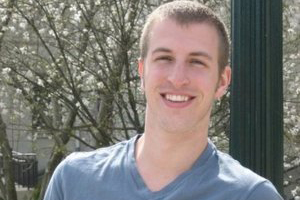Alumni
Social Media Sparks New Experiences

While most students were preparing for exams and dutifully finishing papers the weekend before spring break, Carter Gibson, KSB/BSBA ’12, SOC/BAFM ’12, was on a flight to Long Beach, California, for the 6th annual BIL Conference.
The BIL Conference is often referred to as an “un-conference” and a place for “passionate people to come together, energize, brainstorm, and take action.”
While it may sound traditional in theory, Gibson said in the relaxed environment, each speaker’s role is more of a conversation than a formal presentation.
Getting Involved
Gibson is a recent member of the BIL community; he joined the team in December after agreeing to help a friend set up a Google+ page for BIL, an organizational acronym for Bilateral, Ingenious, Life.
“I agreed not knowing what I was getting myself into, and soon found myself learning more about what BIL stood for so that I could best be the voice of the page on Google+,” said Gibson. “I loved it and wanted to be a part of it.”
With an impressive number of his own Google+ followers—40,000, a community he acquired in mere months—Gibson not only became BIL’s Google+ community manager, but was asked to speak at the conference and became the newest addition to BIL’s core team.
Online Marketing
Gibson credits his success online to a combination of personal branding and active engagement.
“I’m a personality and people are interested in engaging with me,” he said.
His initial presence on Google+ was part of an internship blogging for the Ad Council, where Gibson worked in the summer of 2011.
“What really sent me ‘over the edge’ is that I became a core user of Google+ Hangouts,” said Gibson, a live video chat with up to 10 people. “I got to know these people very well, got a reputation for being engaging, and was shared consistently in circles of interesting people to follow,” said Gibson.
He explained that attaining a lot of followers is due solely to his person-to-person interactions online, emphasizing connecting with people rather than simply following companies.
“I think that people still associate a lot of followers with brand pages and companies as opposed to people, which is why there’s confusion about how an individual like me can get more than 40,000 followers in just a few months.
“While having a ton of followers with no outside help has absolutely changed my entire life, it’s not the most important thing to me. I care about connections, learning, and expanding my horizons,” said Gibson.
Managing it All
Gibson has worked toward two degrees. He graduated in 2011 with a BS in Business Administration and is graduating this May with his second degree, a BA in Film and Media Arts, all while maintaining active involvement on campus as an Orientation Leader, Vice President of the Inter-Fraternity Counsel, and a Peer Consultant for the KCCD.
He is also part of the 89 percent of Kogod undergraduates who have held internships; one at RealEstate Business Intelligence, LLC and one at the Advertising Council.
“It took a lot of hard work, and it seems both impossible and crazy, but I think when you’re passionate about what you’re doing, you can find time to get it all done, even if you have to pull a few strings here and there,” said Gibson.
Passion is what fueled his talk at the BIL Conference; explaining that while his post-graduation future is currently undecided, he knows it will involve helping people solidify their identity online.
“We need to be more human online,” said Gibson, and a large component is “consolidating our fragmented online identities,” especially with the number of platforms available on the Internet.
“That question was a huge part of what I spoke about as was answering whether or not the Internet offers us the ability to advance our identities without the constraints of our real-life social circles,” said Gibson.
According to Gibson, the answer is yes.
“When the Internet was founded it was a way to escape real life and be whoever we wanted to be. Now that we’re all but demanded to have a public presence online, those societal pressures in real life are mirrored in digital space. Realizing that we can escape them and still be public is one the most important realizations we can have as our online and real life personalities begin to merge,” said Gibson.
Advice to Students
With so many platforms as well as the seemingly social “requirement”, Gibson advised current students debating their presence on LinkedIn, Twitter, Facebook, Tumbler, and the multitude of other social networks to very simply be themselves.
“Let yourself shine through,” he said. “It’s exhausting to be yourself, but it’s more exhausting to be five or six people. Being friendly on Facebook, professional on LinkedIn, witty on Twitter, funny on Tumblr, or intelligent on a forum creates a fragmented identity that isn’t representative of the human experience or even a human itself!
“I say take a breather, relax, think about what you really want to use the Internet for, and be natural,” said Gibson.
